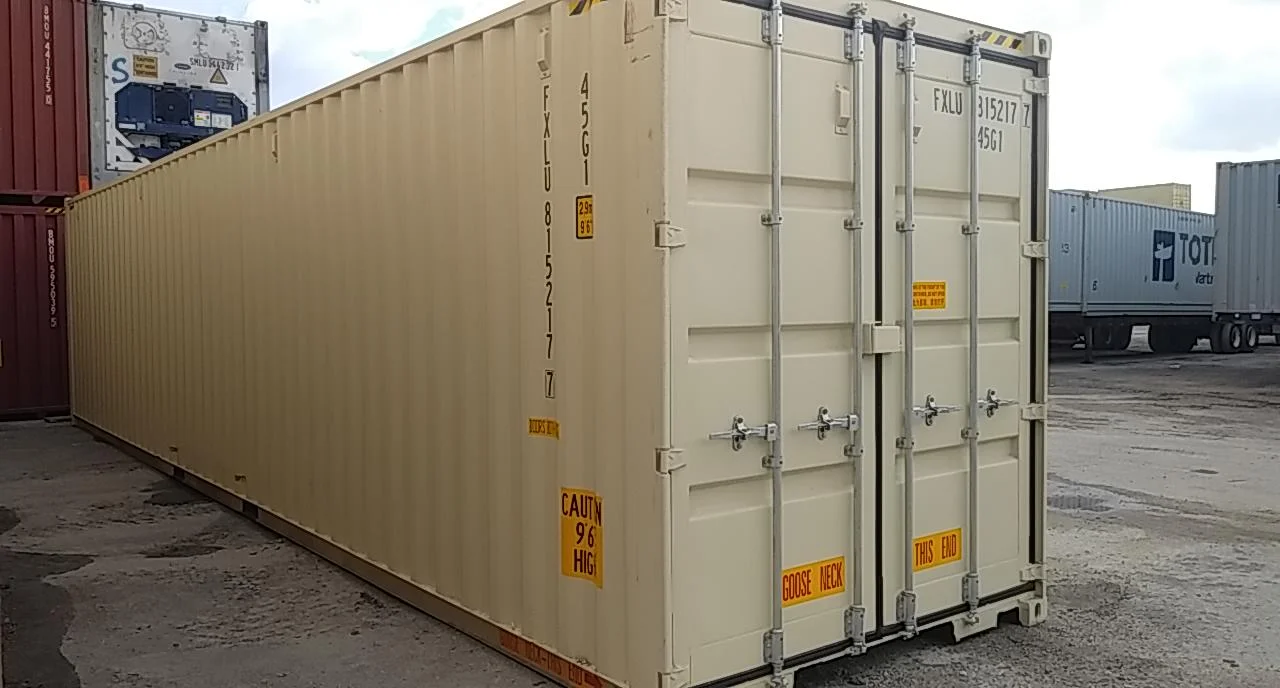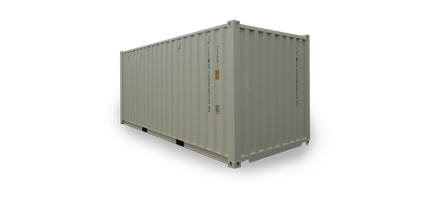Planning a Pop-Up Shop? Lease New Shipping Container 40 x 8 x 9.6 Like This Brand Did
Planning a Pop-Up Shop? Lease New Shipping Container 40 x 8 x 9.6 Like This Brand Did
Blog Article
The Ultimate Overview to Choosing the Right Shipping Container for Your Demands
When it comes to choosing the ideal delivery container, understanding your certain demands is important. You'll want to think about variables like size, kind, and material to ensure you make the ideal option. From basic dimensions to specialized choices, there's a great deal to discover. And also, budgeting for both the container and any modifications can make a huge distinction. Let's break down the key facets to help you locate the ideal fit for your demands.
Recognizing Delivery Container Sizes
When you're picking a shipping container, recognizing the numerous dimensions available is vital for making the ideal decision. Shipping containers normally are available in basic lengths of 20 and 40 feet, however you'll likewise discover various other measurements. Recognizing the size you need depends upon what you plan to shop or transport.If you're moving smaller sized items, a 20-foot container could be perfect, while larger deliveries commonly call for a 40-foot container. The height can additionally differ; high cube containers use extra upright room, which can be helpful for taller goods.Before making a decision, determine your cargo, and consider how much space you'll require for loading and discharging. Always factor in potential future requirements-- selecting a somewhat larger container might conserve you headache down the line. Eventually, choosing the best size will certainly improve efficiency and assure your items are safe during transit
Types of Shipping Containers Available
There are several types of shipping containers readily available, each developed for specific functions and freight requirements. The common dry container is flexible, excellent for basic cargo. If you're shipping disposable products, take into consideration a cooled container, which maintains a controlled temperature level. For extra-large items, high cube containers provide additional elevation, accommodating taller loads.If you require to carry heavy equipment or equipment, level rack containers offer a sturdy base without wall surfaces. Open-top containers permit for very easy loading of high freight, with a detachable tarpaulin covering for defense. If you're searching for versatility, consider a collapsible container that can be quickly kept when not in use.Lastly, specialized containers like tank containers are utilized for liquids, while vented containers are designed for bulk cargo that needs air flow. Knowing your freight kind will certainly assist you select the ideal container to meet your delivery needs effectively.
Material Factors To Consider for Toughness
When picking a shipping container, the material plays a crucial role in its longevity. You'll desire to consider the benefits of steel versus light weight aluminum, especially pertaining to corrosion resistance. Comprehending these factors can help you make a much more enlightened selection for your delivery needs.
Steel vs. Light weight aluminum Containers
Exactly how do you choose between steel and light weight aluminum containers for your shipping requires? Start by considering longevity. Steel containers are robust and offer exceptional strength, making them optimal for hefty tons and extreme problems. They resist damages from impacts and are often more economical, which can be a significant variable for budget-conscious buyers.On the other hand, aluminum containers are light-weight, which can save you on shipping expenses. They're less complicated to navigate and are a fantastic option if you need to carry products often. However, aluminum is generally a lot more expensive and less robust than steel. Weigh your particular demands carefully, consisting of weight, price, and the kind of freight you'll be shipping, to make the ideal selection for your situation.
Corrosion Resistance Aspects
Picking the best product doesn't just involve weight and price; corrosion resistance plays a substantial duty in durability. When picking a shipping container, think about the environment it'll deal with. Steel containers, while solid, can corrosion otherwise appropriately dealt with. Try to find options with safety coatings or galvanization to boost their life-span. Light weight aluminum, on the various other hand, supplies all-natural deterioration resistance, making it ideal for coastal areas or moist problems. Nevertheless, it can be much more pricey. In addition, analyze the container's use-- if it'll be exposed to chemicals or severe weather, prioritize products that can endure these conditions. Investing in a corrosion-resistant container now can save you from costly repairs her response or substitutes down the line. Pick intelligently for lasting advantages.
Modifications and Customization Options
Shipping containers aren't just for transporting goods; they can be transformed to satisfy your specific needs through various alterations and personalization alternatives. You can transform a standard container into a comfy workplace, a short-lived retail store, or perhaps a personal fitness center. The possibilities are almost endless.Think regarding adding windows, insulation, or ventilation to enhance comfort. You might also think about electrical wiring, plumbing, or Bonuses perhaps custom shelving to boost performance. If protection's an issue, strengthened locks can offer peace of mind.For visual appeal, you can repaint the container or include an one-of-a-kind style to make it stand apart. Don't forget flooring options-- whether you want long lasting plywood or something a lot more advanced, it can boost the space.Ultimately, customizing your delivery container to fit your requirements can improve functionality and develop an one-of-a-kind setting that reflects your style.
Assessing Your Transport Demands
When it concerns using your changed delivery container, comprehending your transportation requires is crucial. Beginning by establishing what you'll be shipping-- whether it's hefty equipment, retail products, or individual things. Each sort of cargo has various needs regarding dimension, weight, and accessibility.Next, think about the range and setting of transportation. Are you delivering locally, across the country, or internationally? This affects the container's design and functionality. If you're using vehicles, ensure your container fits typical dimensions for simple loading and unloading.Additionally, consider transit conditions. Will your things need special security from weather or temperature fluctuations? If so, you may require insulation or ventilation functions in your container.Lastly, evaluate just how often you'll be transporting products. Frequent deliveries may call for an extra resilient and functional container to fulfill ongoing needs. By addressing these variables, you'll be well-prepared to pick the right shipping container for your demands.
Budgeting for Your Shipping Container
Establishing a spending plan for your delivery container is crucial for making sure a smooth purchasing procedure. First, figure out exactly how much you can pay for to spend. about his Keep in mind that prices can vary substantially based on size, condition, and kind. New containers normally cost a lot more, yet utilized ones can provide substantial savings.Next, think about any kind of additional costs you might sustain, such as transport charges, distribution fees, and adjustments. If you plan to personalize the container, consider those costs also. Study different suppliers to contrast prices and discover the most effective offer that satisfies your needs.Don' t forget to consist of any kind of licenses or laws that may put on your acquisition and usage of the container. By plainly outlining your budget plan, you'll be much better prepared to make informed choices, ensuring you get the ideal container without damaging the bank.
Maintenance and Look After Long life
To guarantee your delivery container lasts for many years, normal upkeep is essential. Begin by examining the exterior for rust, damages, and damage. If you find any kind of concerns, resolve them quickly to protect against more wear and tear. Tidy the container periodically, both in and out, to eliminate dust, debris, and dampness that can result in corrosion.Ensure the doors secure correctly and lube the hinges to avoid rust and sticking. If you're making use of the container for storage, think about including air flow to reduce moisture and mold and mildew growth. For added protection, use a rust-inhibiting paint or sealant annually.If your container's situated in an extreme environment, like coastal locations, you might need to enhance upkeep frequency. Maintain an eye on the floor covering, also; any type of indications of wear ought to be repaired as soon as possible. With these easy steps, you'll prolong the life of your shipping container significantly.
Often Asked Inquiries
How Do I Find a Reliable Shipping Container Distributor?
To find a trusted shipping container vendor, beginning by researching on the internet evaluations, asking for suggestions from close friends or market get in touches with, and comparing costs. Always examine their credentials and guarantee they offer quality containers that satisfy your needs.

Can I Rental Fee a Delivery Container Rather of Acquiring?
Yes, you can most definitely rent out a delivery container rather than acquiring one. Many suppliers offer rental alternatives, which can save you cash and supply versatility if you only require it for a short duration.
What Allows Are Required for Container Placement?

Are Shipping Containers Weatherproof and Ideal for Outdoor Storage?
Yes, shipping containers are normally weatherproof, made to endure rough conditions. Their robust building and construction maintains your products secure and completely dry, making them ideal for exterior storage. Just guarantee appropriate air flow to stop dampness buildup inside.
How Do I Carry a Shipping Container Once Acquired?

Report this page